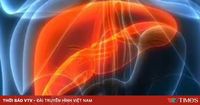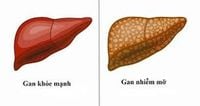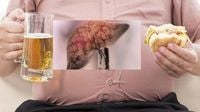Fatty liver disease, a condition often overlooked, poses significant health risks, including a staggering 20-fold increase in the likelihood of developing colon cancer. It also impacts various other health conditions such as cardiovascular disease, chronic kidney disease, and sleep apnea. The silent nature of this disease makes it particularly dangerous, as many individuals remain unaware of its presence until severe complications arise.
According to ThS.BS Luu Thi Minh Diep from Bach Mai Hospital, fatty liver is characterized by excessive fat accumulation in the liver, exceeding 5% of the organ's weight, which in turn affects its overall function. The causes of this condition are multifaceted and include unhealthy dietary habits, obesity, sedentary lifestyles, and metabolic disorders.
There are five primary risk factors contributing to fatty liver disease: unhealthy eating habits, obesity and excess weight, lack of physical activity, metabolic disorders such as diabetes and high blood pressure, and genetic predisposition. The modern diet, filled with high sugar content, fats, processed foods, and alcohol consumption, significantly elevates the risk of developing this condition.
In the early stages, fatty liver disease often presents no clear symptoms, making it challenging for patients to recognize its onset. As the disease progresses, individuals may experience various symptoms, including fatigue, discomfort, itchy skin, hives, pain or heaviness in the right abdomen, loss of appetite, nausea, and unexplained weight loss, particularly after consuming fatty foods.
In severe cases, fatty liver can escalate to cirrhosis or hepatitis, leading to critical liver dysfunction. Symptoms of advanced liver disease may include jaundice (yellowing of the skin and eyes), nosebleeds, and bleeding gums. These severe manifestations highlight the importance of early detection and management.
Modern medicine classifies fatty liver disease into three distinct categories based on severity: mild (known as Metabolic Associated Steatotic Liver Disease or MASLD), moderate (Metabolic Associated Steatotic Hepatitis or MASH), and severe. Mild fatty liver indicates fat accumulation without inflammation or cell damage, which can often be reversed through lifestyle changes. Moderate fatty liver may involve inflammation but can still be managed with dietary adjustments and exercise. Severe fatty liver, however, requires aggressive treatment and regular monitoring due to the risk of progression to cirrhosis or liver cancer.
To accurately diagnose fatty liver disease, healthcare providers may recommend several tests. Blood tests measuring liver enzymes such as AST (Aspartate Aminotransferase), ALT (Alanine Aminotransferase), and GGT (Gamma-Glutamyl Transferase) can indicate liver inflammation or damage. Additionally, tests assessing glucose and cholesterol levels help evaluate associated metabolic disorders.
Liver ultrasound is a commonly used imaging technique that provides a preliminary assessment of fatty liver condition. More advanced imaging methods, such as CT scans or MRIs, offer detailed insights, particularly in cases of disease progression. In severe situations, a liver biopsy may be performed to determine the extent of liver damage. FibroScan, a non-invasive method, measures liver stiffness and fat content, providing valuable information in the management of fatty liver disease.
Prevention and treatment of fatty liver disease hinge significantly on lifestyle modifications. A healthy diet rich in vegetables, fresh fruits, and fiber while minimizing sugar, fats, and processed foods is fundamental. Regular physical activity, aiming for at least 30 minutes daily, can significantly aid in weight management and fat reduction.
Weight loss plays a critical role in improving fatty liver conditions. Studies suggest that a reduction of over 3% of body weight can lead to improved fat accumulation, while a decrease of 5-7% can enhance liver inflammation. More substantial weight loss, exceeding 10%, may even improve fibrosis, underscoring the importance of maintaining a healthy weight.
Furthermore, effective management of underlying health conditions, such as diabetes and high blood pressure, is crucial in preventing complications associated with fatty liver disease. Regular health check-ups are recommended, especially for individuals with risk factors, to facilitate early detection and timely intervention.
Fatty liver disease is not an insurmountable condition; it can be prevented and treated effectively if identified early. Individuals are encouraged to adopt a healthy lifestyle, maintain a balanced diet, and engage in regular physical activities to safeguard their liver health. If any unusual symptoms related to liver function arise, seeking medical advice promptly is essential for effective management.
In summary, awareness and proactive measures are vital in combating fatty liver disease. With the right lifestyle choices and medical guidance, individuals can protect their liver health and reduce the risk of severe complications.







